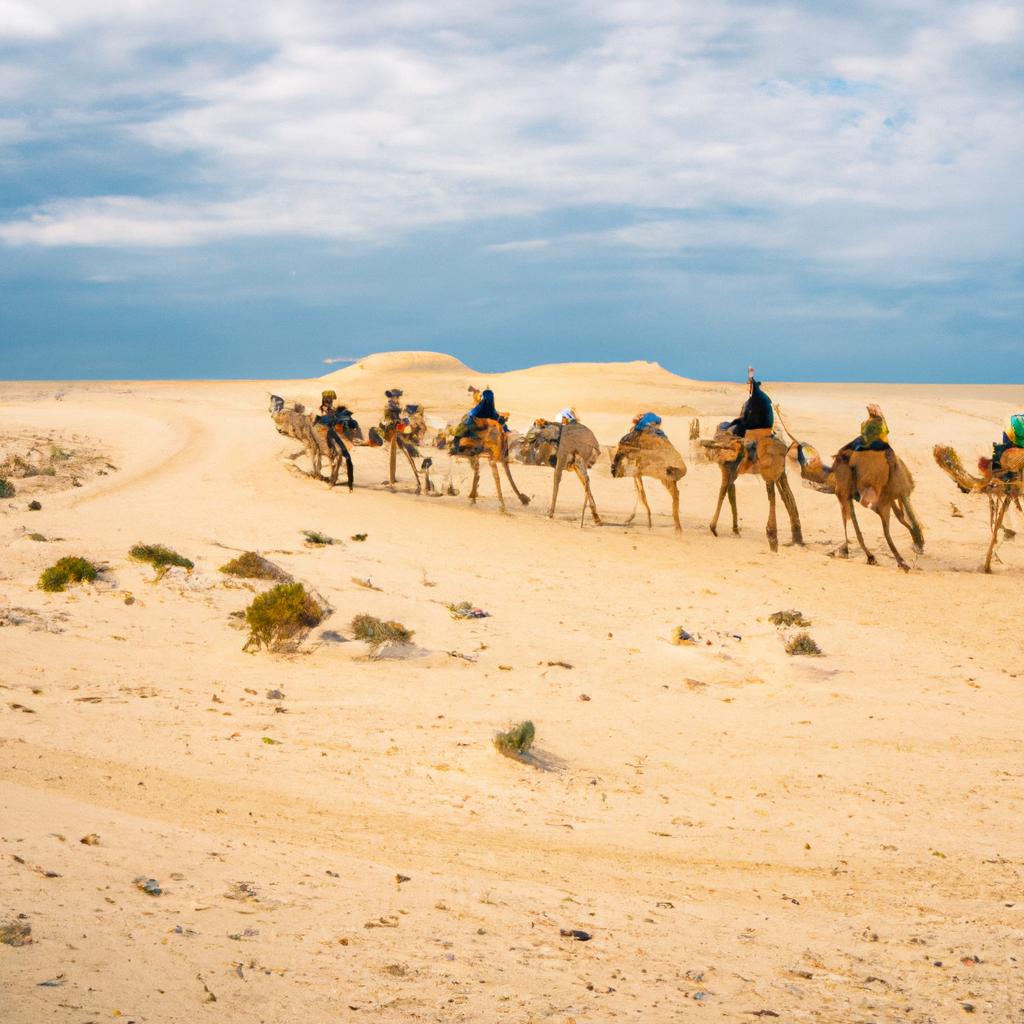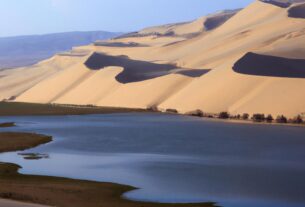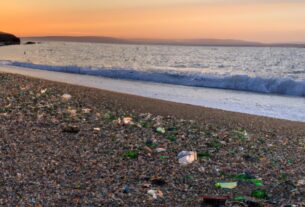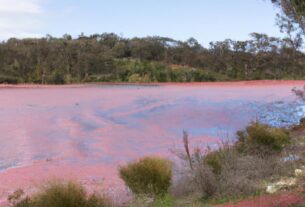The Tunisian desert is a treasure trove of natural beauty and cultural significance, just waiting to be discovered. With its vast stretches of sand dunes, salt flats, and lush oases, this remarkable landscape offers a glimpse into a world steeped in history and brimming with biodiversity.
As tourism in the region continues to flourish, it becomes increasingly important to adopt sustainable practices that preserve the delicate ecosystem and safeguard the cultural heritage of local communities. This is where eco-tourism comes into play, presenting visitors with an opportunity to explore the desert’s allure while minimizing their environmental impact.
History and Culture
The Tunisian desert boasts an ancient history and a cultural heritage that spans thousands of years. It has been home to Berber tribes, who have developed a unique way of life intricately connected to the desert ecosystem.
The Berber tribes have fostered a profound reverence for the environment, nurturing a lifestyle that harmonizes with the desert. Their vast knowledge of the region’s plants and animals has led to the development of sustainable practices for resource utilization.
Rich in cultural heritage, the Berber tribes express their traditions through traditional music, dance, and crafts. By visiting local villages and engaging in cultural activities, tourists can immerse themselves in these authentic experiences, preserving these customs for future generations.
Preserving Cultural Heritage through Tourism
Tourism plays a pivotal role in safeguarding the cultural legacy of the Tunisian desert. By promoting responsible practices, we empower local communities to protect and share their heritage sustainably.
One prime example is the annual Festival of the Sahara, a magnificent celebration of the region’s cultural heritage through music, dance, and traditional crafts. This festival offers visitors an opportunity to delve into the history and culture of the desert while supporting the local economy.
In essence, the history and culture of the Tunisian desert form an integral part of the region’s identity, deserving protection and celebration. Through sustainable tourism and support for local communities, we can ensure the preservation of this unique cultural heritage for generations to come.
Natural Wonders
The Tunisian desert is a realm of diverse landscapes, each possessing its own distinct allure. From the expansive salt flats of Chott el Djerid to the verdant oases of Tozeur, marvels of nature are abundant, awaiting discovery.
One of the most captivating features is the desert’s majestic sand dunes. Shaped over centuries by the relentless wind, these towering mounds of sand embody the raw power and beauty of nature. Sahara’s dunes stand tall as some of the largest in the world, with heights exceeding 400 meters.
Beyond the enchanting dunes, the desert reveals an array of landscapes, including rocky outcrops, canyons, and salt flats. Perhaps the most renowned of these wonders is Chott el Djerid, an expansive salt lake covering over 5,000 square kilometers.
Despite its harsh environment, the Tunisian desert teems with diverse flora and fauna. From the majestic date palms of the oasis to the resilient acacia trees that dot the landscape, life thrives in this seemingly inhospitable realm. The desert’s inhabitants include camels, gazelles, and desert foxes, with the iconic dromedary camel standing out for its unique hump and remarkable ability to endure extended periods without water.
Conservation efforts are critical as the Tunisian desert gains popularity as a tourist destination. By embracing sustainable practices such as responsible camping and waste reduction, we can minimize the environmental impact of tourism. It is equally important to protect the desert’s flora and fauna. The Tunisian government has implemented measures to safeguard endangered species, including the Saharan cheetah and the Barbary macaque.
In conclusion, the natural wonders of the Tunisian desert bear testament to the captivating power and allure of nature. It is our collective responsibility to preserve and protect these treasures, ensuring their enjoyment by future generations.
Adventure and Sports
For thrill-seekers and adventure enthusiasts, the Tunisian desert presents an array of exhilarating activities guaranteed to ignite the spirit. From camel trekking to sandboarding, this massive and captivating landscape offers something for everyone.
Camel trekking constitutes a popular pursuit in the Tunisian desert, granting visitors an opportunity to experience the wilderness like nomads of old. Mounted atop camels, adventurers traverse the expansive sand dunes, taking in breathtaking views and relishing the serenity of the desert.
For a more adrenaline-fueled escapade, sandboarding beckons. Similar to snowboarding, this thrilling activity entails sliding down steep sand dunes on a board. It promises a joyous and unforgettable experience.
As adventure tourism gains momentum in the region, it becomes crucial to promote eco-tourism and responsible travel practices. By minimizing our impact on the environment and supporting local communities, we preserve the delicate balance of the ecosystem and contribute to the local economy.
The growth of adventure tourism also plays a vital role in fostering sustainable development. By creating employment opportunities and stimulating local businesses, tourism helps alleviate poverty and drive economic progress in the region. However, it is essential to ensure that these benefits are equitably distributed across the community and that all stakeholders embrace sustainable tourism practices.
In conclusion, adventure and sports form an integral part of the Tunisian desert experience, enabling visitors to explore this unique and captivating landscape. By promoting eco-tourism and responsible travel, we safeguard the environment while embarking on thrilling escapades.
Local Communities
The Tunisian desert is not solely a natural wonder but also a vibrant tapestry woven by diverse and lively communities. These communities play a pivotal role in promoting sustainable tourism, ensuring that visitors enjoy an authentic experience while supporting the local economy.
Local communities in the Tunisian desert possess a profound connection to the land and are dedicated to preserving their cultural heritage. They champion sustainable tourism practices, such as responsible waste management, eco-friendly transportation, and the use of renewable energy sources.
By collaborating with local communities, tourists gain insight into the region’s distinctive history and traditions while minimizing their impact on the environment.
Tourism has provided crucial economic opportunities for many communities in the Tunisian desert, generating income and creating employment. From offering camel rides and guided tours to running small shops and restaurants, the tourism industry has diversified the local economy, decreasing reliance on traditional industries like agriculture.
By staying at locally-owned guesthouses, dining at local eateries, and purchasing crafts from local artisans, visitors directly support the local economy.
Preserving cultural traditions is of paramount importance to the local communities of the Tunisian desert. By embracing sustainable tourism, tourists contribute to the continued flourishing of these traditions, ensuring their perpetuation for future generations. Attend traditional music and dance performances, learn the art of pottery and weaving—a myriad of authentic cultural experiences awaits.
In conclusion, the local communities of the Tunisian desert are pivotal in promoting sustainable tourism and preserving the region’s cultural heritage. By supporting local businesses and engaging with the community, visitors partake in unforgettable and genuine experiences while contributing to the local economy and protecting the environment.
Conclusion
To conclude, the Tunisian desert remains a hidden gem that promises a unique and unforgettable experience to all who venture there. From awe-inspiring landscapes to rich cultural heritage, this desert has it all.
However, our travels must be responsible and sustainable, mindful of the environment and the local communities that call the desert home. By promoting eco-tourism and responsible travel, we safeguard the natural and cultural treasures of the region while fostering sustainable development.
At TooLacks, we believe that travel should enrich our lives and the lives of the local communities we encounter. By championing sustainable tourism practices, we strive to create a better world for ourselves and future generations.
So, if you’re seeking an adventure that combines thrills with responsibility, embark on a journey to uncover the hidden gems of the Tunisian desert. You won’t be disappointed!
Tune in to TooLacks to discover more about responsible travel and enriching experiences.



